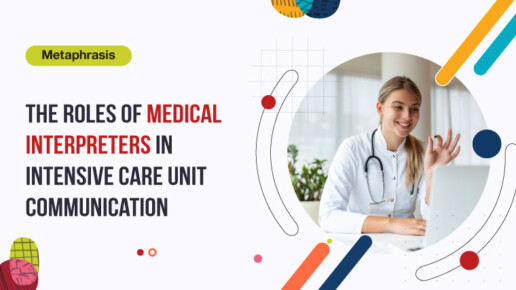The Roles of Medical Interpreters in intensive care unit Communication
Effective communication is the cornerstone of quality healthcare, and nowhere is this more critical than in the Intensive Care Unit (ICU). The ability to convey accurate medical information in a timely and culturally sensitive manner can make a significant difference in patient outcomes. In this blog, we explore the indispensable roles of medical interpreters in ICU communication, shedding light on the challenges we face, their impact on patient care, and the evolving landscape of medical interpretation.
Introduction
In the fast-paced world of healthcare, where every second counts, effective communication is a non-negotiable element. The ICU, being a high-stakes environment, demands precision in information exchange. Medical interpreters play a vital role in ensuring that language barriers do not impede the flow of critical information between healthcare professionals and patients.
Understanding the Intensive Care Unit (ICU) Environment
The ICU presents unique challenges, including high-stress situations, emotional conversations, and rapid decision-making scenarios. These factors underscore the need for clear and concise communication. In this section, we delve into the intricacies of the ICU and why accurate information exchange is paramount.
The Significance of Medical Interpreters
Medical interpreters act as linguistic bridges, facilitating communication between patients, their families, and healthcare providers. Their role goes beyond mere translation; metaphrasis ensure that the nuances of language and cultural context are accurately conveyed, minimizing the risk of misunderstandings that could have severe consequences.
Key Skills of Medical Interpreters
To excel in their role, medical interpreters need a unique set of skills. Proficiency in multiple languages, cultural competence, and a deep understanding of medical terminology are essential. This section explores these key skills and their importance in the demanding field of medical interpretation.
Challenges Faced by Medical Interpreters in the ICU
Working in the ICU presents a set of challenges for medical interpreters. We must navigate high-stress situations, emotionally charged conversations, and make split-second decisions. Overcoming these challenges requires resilience and a deep commitment to their role in facilitating effective communication.
Impact on Patient Care
The influence of medical interpreters on patient care cannot be overstated. By ensuring that patients understand their diagnoses, treatment plans, and follow-up care, interpreters contribute significantly to improved patient outcomes. Additionally, we play a crucial role in reducing the likelihood of medical errors that can arise from miscommunication.
Collaboration with Healthcare Professionals
In the collaborative environment of the ICU, medical interpreters work closely with healthcare professionals to ensure seamless communication. Their teamwork with nurses, doctors, and other staff members is vital in providing holistic and patient-centered care.
Training and Certification for Medical Interpreters
Recognizing the specialized nature of their role, medical interpreters undergo rigorous training and certification programs. This section explores the importance of such programs in equipping interpreters with the necessary skills and ensuring adherence to professional standards.
Technological Advancements in Medical Interpretation
Advancements in technology have revolutionized the field of medical interpretation. Telemedicine and remote interpretation services have become increasingly prevalent, expanding access to interpretation services and overcoming geographical constraints.
Success Stories of Effective Communication
Real-life examples demonstrate the positive impact of effective communication facilitated by medical interpreters. These stories highlight instances where clear and accurate interpretation led to improved patient satisfaction, better adherence to treatment plans, and overall enhanced healthcare experiences.
Legal and Ethical Considerations
Navigating legal and ethical considerations is an integral part of the medical interpreter’s role. Confidentiality in medical interpretation and adherence to ethical standards are crucial to maintaining trust between interpreters, healthcare providers, and patients.
Future Trends in Medical Interpretation
As technology continues to advance, the role of medical interpreters is evolving. Integration of artificial intelligence and continuous improvement in interpreter services are shaping the future of medical interpretation, ensuring that it remains a dynamic and responsive field.
Feedback and Evaluation Process
Ensuring the effectiveness of medical interpretation involves establishing robust feedback and evaluation mechanisms. Healthcare institutions must assess the quality of interpretation services, identify areas for improvement, and implement strategies to enhance overall communication.
Cost-Effectiveness of Utilizing Medical Interpreters
While there may be associated costs with implementing interpreter services, the long-term benefits for healthcare institutions far outweigh the initial investment. Improved patient outcomes, reduced medical errors, and enhanced patient satisfaction contribute to a positive return on investment in medical interpretation services.
Conclusion
In conclusion, the roles of medical interpreters in intensive care unit communication are pivotal to the delivery of quality healthcare. Their ability to bridge language gaps, navigate challenging scenarios, and contribute to collaborative care makes them indispensable in the healthcare ecosystem. As we move forward, the need for effective communication will only grow, emphasizing the ongoing significance of medical interpreters.

